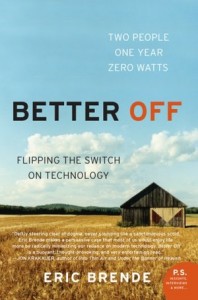 Eric Brende has never totally comfortable with technology. It’s supposed to make life easier, but does it really? Does technology actually save us any time, or does it add complexity that actually makes life harder, and us as individuals less connected and less happy?
Eric Brende has never totally comfortable with technology. It’s supposed to make life easier, but does it really? Does technology actually save us any time, or does it add complexity that actually makes life harder, and us as individuals less connected and less happy?
Better Off: Flipping the Switch on Technology follows one young couple on a year-long experiment to answer the question, are we better off without technology?
Some thoughts
I must confess to thinking the same thoughts Brende voices in this book. I create and work with websites for a living, but I’ve never been big on gadgets — they complicate my life and I don’t need the extra stress that technology can bring. I’ve often wondered what it would be like to get rid of a bunch of it, but lack the knowledge (and courage) to get along without it.
Which is where Brende and Better Off enter. The book operates under two premises:
- Technology complicates – Technology complicates rather than simplifies our lives. The more technology we use, the more time we spend troubleshooting and maintaining it. We often serve technology more than it serves us.
- Technology isolates – Without technology one has to depend more on one’s neighbors and community for help with planting, picking, preserving, building, repairing, etc. Helping your neighbors, and your helping them in return, builds a community that technology tends to break down.
I agree with both these premises, although the second makes me hesitate. I don’t know if technology has destroyed community so much as redefined it. The Internet, and especially social media, has and will continue to revolutionize the way we communicate and spread information. Technology enables us to connect on a global scale, which in some ways I consider more important than having extra sets of hands to help me with my laundry or garden.
Brende uses the term “Minimites” (possibly the best word ever) to describe the community into which he and his wife move. Many of their neighbors are some derivation of Mennonite or Amish, although for some—including the author—living there is less about practicing a religion and more about exercising a lifestyle choice.
Bottom line
It was fascinating to read about Brende’s adventure and how it went from an experiment in “making do” to a permanent part of his family’s life. The book’s appendix includes “Practical Tips for a Leaner and More Leisurely Life in a World of Technology” as well a recommended reading list for those interested in cutting down on technology. Thumbs up to Brende for educating me — now if only he could lend me the courage!
Could you live without technology? What would be hardest (and easiest) for you to give up?







Oh that would be way too hard! There’s something’s I could easily give up but not everything. No freaking way!
Yea, there are definitely some things that would be easier to give up than others. I could do without an electric washer/dryer, but mama needs electricity, if only to run the air conditioning! 😀
Very interesting! This is a subject that keeps coming up around our dinner table. I maintain that there is no going back to a non-tech life and that it is a wonderful tool when used in moderation. If I were to get rid of my computer and cell phone then the onus is on everyone else to get in touch with me the old fashioned way. I’d much rather stay connected even if I only checking messages and email once a day.
Going back to “non-tech life” on a global scale would certainly be impossible, but it’s simpler to do so at the household level. The nice thing about Brende is that he’s not against technology because it’s technology, but because he thinks a lot of it gets in the way of community and family. We end up serving that technology, instead of the other way around.
I wouldn’t mind not having a cell phone. Sometimes a little distance is good. 🙂